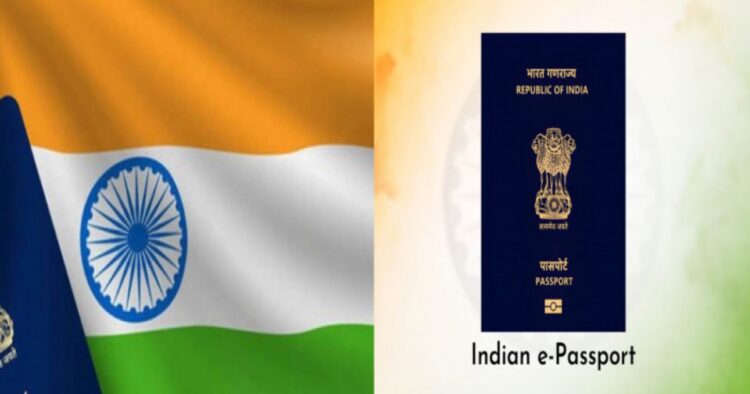KEY POINTS
- Nationwide e-passport launch in May 2025
- RFID chip with biometric security
- 20,000+ issued in Tamil Nadu pilot phase
India is all set to introduce chip-based e-passports across the country starting May 2025, marking a huge shift in how citizens will travel abroad. This move, driven by the Ministry of External Affairs (MEA) and executed in partnership with the India Security Press (ISP) in Nashik, is part of India’s larger ambition to modernise its governance systems under the Digital India mission.
The e-passport is not just a regular upgrade. It brings India into the league of developed nations like Germany, the United States, and the UK, which already use biometric-based smart passports. Through this, India is embracing the global digital passport revolution.
What Makes an E-Passport Special? A Look into the Technology
Unlike traditional passports, an e-passport contains an embedded Radio Frequency Identification (RFID) chip. This chip stores personal details and biometric data like facial image, fingerprints, and iris scans in a secure and encrypted format. If anyone tries to tamper with the chip, the passport becomes invalid.
These passports follow International Civil Aviation Organisation (ICAO) Document 9303 standards and the ISO/IEC 14443 guidelines, making them readable by immigration systems worldwide. This ensures global compatibility and smooth travel for Indian passport holders.
Before the full rollout, the government launched a pilot program on April 1, 2024, under the Passport Seva Programme Version 2.0. Cities like Chennai, Jaipur, Hyderabad, Nagpur, Amritsar, Goa, Raipur, Surat, Ranchi, Bhubaneswar, Jammu, and Shimla were selected.
In Chennai, the e-passport system began on March 3, 2025. By March 22, over 20,729 e-passports had already been issued in Tamil Nadu, showing strong demand and smooth implementation.
Enhancing Travel Safety and Reducing Passport Fraud
The use of encrypted chips and Extended Access Control (EAC) protocols means that only authorized border control systems can read sensitive biometric information. This significantly reduces the risk of passport fraud, duplication, and identity theft.
With multi-layered cybersecurity systems, the government has made it clear that personal data will be used only for passport-related services and not shared for any secondary purposes. This approach brings India closer to global privacy standards.
The e-passport system will allow automatic identity verification, which means travellers won’t have to stand in long queues anymore. Biometric data will make immigration checks faster and more secure. This is in line with global airport modernization trends, making India’s airports future-ready.
Countries that already use e-passports report shorter immigration times and improved traveller experience—a benefit that Indian citizens will soon enjoy.
Digital India: One More Step Toward a Smart Nation
This project fits perfectly into the Digital India vision. By digitizing travel documents, India is creating a more efficient and transparent system of governance. Citizens will experience less paperwork, faster services, and improved coordination between government departments.
The Passport Seva Programme Version 2.0 is a strong example of using technology to deliver public services better and faster.
The Road Ahead: Challenges and How India Plans to Overcome Them
While this is a positive development, the nationwide rollout will come with some challenges:
- Ensuring enough infrastructure and trained personnel across passport offices
- Educating the public on how to use and protect their e-passports
- Building trust in the new technology, especially among first-time users
- Addressing data protection concerns, since India currently lacks a full-fledged data protection law
An IMF paper pointed out that the absence of strong privacy laws could be a weak point. But the government is working with agencies like NIC and using digital certificates and encryption to safeguard user data.
E-Passports: A Big Advantage for Indian Tourists and Business Travellers
One of the most exciting outcomes of this project is how it will benefit international travellers. Since Indian e-passports will follow ICAO standards, they’ll be easily accepted in most countries, making visa applications and border checks faster.
Indian business travellers and tourists will face fewer delays and smoother entry into countries with advanced immigration systems, helping promote global mobility and trade.
By complying with ICAO protocols and promoting data encryption, India is gaining respect in the global community. This not only improves India’s international image but also shows its commitment to data protection and responsible digital governance.
In a world where cybersecurity and data privacy are top concerns, India’s e-passport initiative strengthens its position in digital diplomacy.
The India Security Press (ISP) in Nashik plays a central role in manufacturing these e-passports. The chip is embedded in the passport’s cover, and it contains the holder’s secure information. ISP ensures that each booklet meets global security norms and printing standards, making tampering or duplication extremely difficult.
The use of contactless smart card inlays, developed in line with SCOSTA guidelines, ensures both security and durability.
The national rollout of e-passports in May 2025 is a major milestone in India’s journey toward modern, secure, and efficient governance. It strengthens national security, improves international mobility, and aligns India with global best practices.
This initiative showcases how technology and policy can work together to make life easier for citizens, and how India is ready to embrace the future of global travel with confidence and pride.
ALSO READ: “Fake Passport Racket In Bengal: Hired Bank Accounts Used For Application Payments”

















Comments